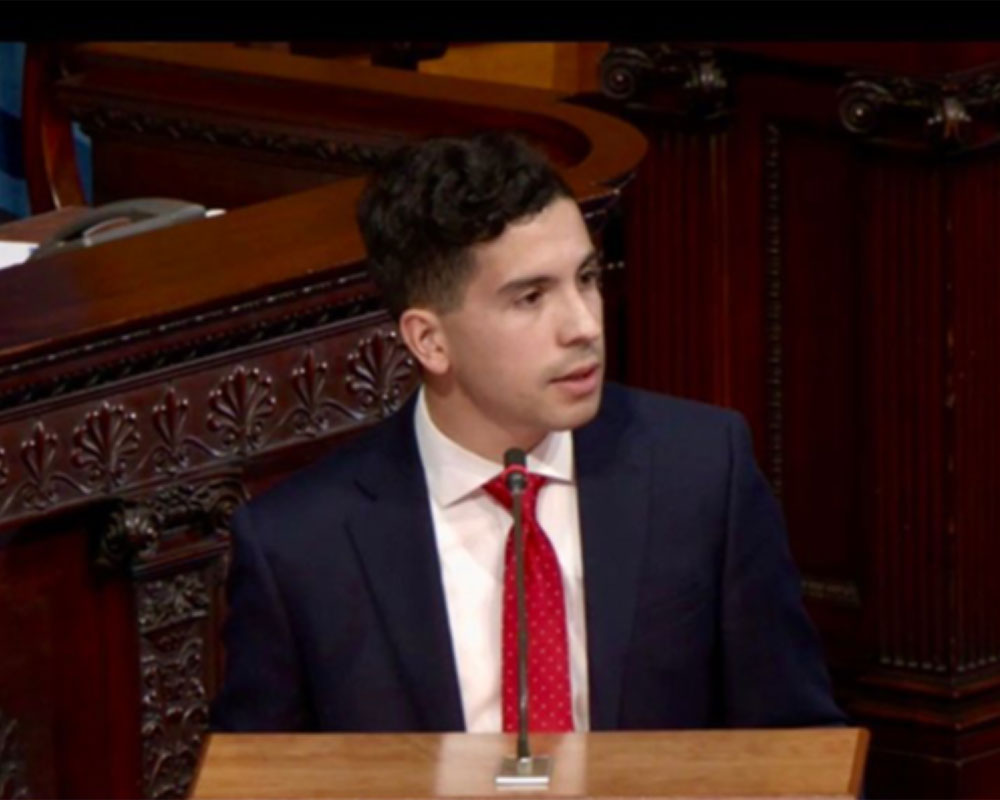The House overwhelmingly approved a bill to legalize sports betting in Massachusetts Thursday night—even hearing reasoning from Haverhill state Rep. Andy X. Vargas that border communities already have such gambling.
The House voted 156-3 to pass its sports betting bill, something a bipartisan parade of representatives said was long overdue.
“I represent a district which borders New Hampshire. In Haverhill, you can literally walk across the border into New Hampshire and place a bet. I know that my constituents who partake in sports wagering would rather place these bets in their homes and in their own state and would rather have any revenue collected going towards benefiting their home state of Massachusetts,” Vargas told his colleagues.
Reps. Mike Connolly, Russell Holmes and Erika Uyterhoeven cast the three dissenting votes. Some said they hoped the House’s lopsided vote would send a message to the Senate, which has been less enthusiastic about sports betting, that the people of Massachusetts want to bet legally.
Even before the vote, however, the question of whether to allow wagers on college sports emerged as a major sticking point between the House and Senate.
House Speaker Ronald Mariano drew a line in the sand on Bloomberg Baystate Radio and declared that leaving collegiate betting out of any bill “probably would be” a dealbreaker.
“That’s a great point, but I tend to think it probably would be,” he said, adding that negotiations have not begun. “I find myself having a tough time trying to justify going through all of this to not include probably the main driver of betting in the Commonwealth.”
Massachusetts has been considering whether to expand gambling here since the U.S. Supreme Court in May 2018 ruled that the nearly nationwide prohibition on sports wagering was unconstitutional and gave states the ability to legalize the activity.
Thirty states, including neighboring Rhode Island, Connecticut, New Hampshire and New York, have authorized gamblers to place legal bets on sports in some fashion. Meanwhile, illicit gambling continues to attract bettors in Massachusetts as well.
Rep. Jerald Parisella, who chairs the Committee on Economic Development, said, “We’re surrounded.”
The House bill would put sports betting under the purview of the Gaming Commission, require that all bettors be at least 21 years old and physically present in Massachusetts, and implement numerous consumer safeguards to protect against problem gambling similar to those put in place for casinos when Massachusetts expanded gaming in 2011.
A sportsbook’s revenue from in-person bets would be taxed at 12.5% and revenue from mobile wagers at 15% Parisella said the higher tax on mobile operators recognizes the added costs that brick-and-mortar facilities would have and aims to drive customers to businesses that employ people in Massachusetts.
“I believe a conservative estimate is that we’ll raise about $60 million annually from the taxes on the sports betting,” Parisella said, citing a number higher than most previous estimates for sports betting in Massachusetts. “And as it gets matured, we believe that those numbers could rise.”
If college betting is not allowed, Mariano said, the revenue estimate would drop to between $25 million and $35 million annually.
An additional 1 percent tax would be levied on wagers placed on sporting events held in Massachusetts to be distributed proportionately between the facilities that hosted the events to be used for “sports wagering security and integrity.”
Rep. Ken Gordon explained last year that venues like Gillette Stadium or TD Garden will need the money to beef up their security “because they’ve got to protect against communication from someone who may be there to have a conversation that we don’t want to occur.”
The House bill would allow wagers on the outcome of college sports contests, but not on the performances of individual college athletes.
